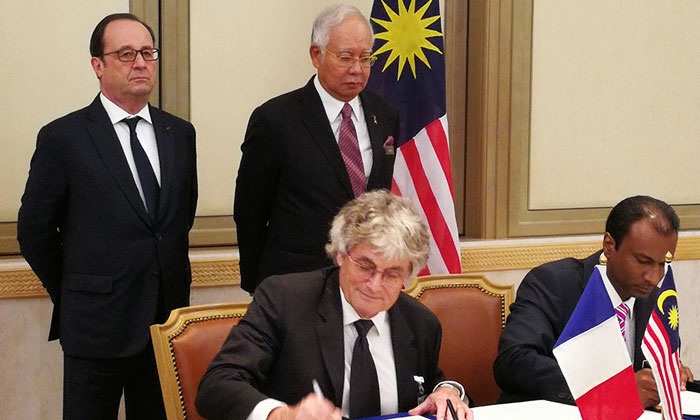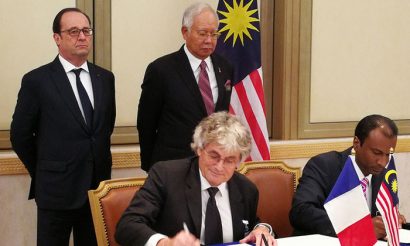New sustainable partnership platform announced in Malaysia and Indonesia
- Like
- Digg
- Del
- Tumblr
- VKontakte
- Buffer
- Love This
- Odnoklassniki
- Meneame
- Blogger
- Amazon
- Yahoo Mail
- Gmail
- AOL
- Newsvine
- HackerNews
- Evernote
- MySpace
- Mail.ru
- Viadeo
- Line
- Comments
- Yummly
- SMS
- Viber
- Telegram
- Subscribe
- Skype
- Facebook Messenger
- Kakao
- LiveJournal
- Yammer
- Edgar
- Fintel
- Mix
- Instapaper
- Copy Link
Posted: 3 April 2017 | New Food | No comments yet
Sustainable Agricultural Landscapes in Southeast Asia: A successful launching for the SALSA partnership platform in Malaysia and Indonesia…


Sustainable Agricultural Landscapes in Southeast Asia: A successful launching for the SALSA partnership platform in Malaysia and Indonesia…
Michel Eddi, CEO of CIRAD, joined the President of the French Republic François Hollande during his State visit to Southeast Asia in March 28-30, 2017. On this occasion, he initiated with several CIRAD partners the construction of the SALSA (Sustainable Agricultural Landscapes in Southeast Asia) partnership platform dedicated to the sustainability of perennial crop systems throughout the region. The launch of this ambitious scientific platform, in which training will be a pivotal component, was formalized by the signing of two multilateral agreements, under the patronage of the French Head of State, in the presence of the Prime Minister of the Government Malaysian and the President of the Republic of Indonesia.
The sustainability of tropical commodity chains at the heart of the public debate
The issue of sustainability of tropical commodity chains is a major issue in Southeast Asia. The recurrent public debate around the impacts of oil palm cultivation, in particular, crystallizes opinions and has direct consequences on the relations between France and producing countries. This is reflected in the discussions on the recent French law proposal suggesting a high differential taxation of palm, palm and coconut oils, which resulted after several weeks of public debate in an exemption from any taxation for certified sustainable vegetable oils.
Thanks to its extensive scientific expertise in perennial crops, CIRAD explores the necessary changes in tropical agricultural sectors in the three components of sustainability: economic, social and environmental. Drawing on more than sixty years of research in tropical agricultural sectors and, beyond that, on an historical involvement in plant breeding and sustainable management of plantations, CIRAD’s work is aiming at providing stakeholders with robust and credible research outputs which generate knowledge about sustainable production systems able at reducing negative impacts on people and their environment.
The SALSA platform
In order to realize this ambition, CIRAD is setting up a partnership platform for the construction of scientific projects and training curricula with its public and private partners in, South-East Asia, a region of the world where problems related to the sustainability of major agricultural sectors are particularly prominent (deforestation, rural poverty reduction, family farming, etc.).
SALSA (Sustainable Agricultural Landscapes in Southeast Asia) aims at regionally federating and mobilizing scientific and training skills on the sustainability of perennial crops sectors. SALSA will promote, within a framework of collective action, the concrete integration of disciplines and multi-stakeholder teams into research, training and development projects that will be conducted on the ground through shared experimental networks and academic and training curricula tailored to the needs for present and future skills.
According to Michel Eddi: “It is a question of being able to propose frameworks of actions and instruments to the public authorities and economic and social actors, in countries from both global North and South, making it possible to progress substantially towards the Sustainability objective, which today is not achieved. The aims are to enrich the incentive tools in the context of public policies in order to promote sustainability, to improve and to make some convergence in the existing certification systems and to set up independent observatories aimed at qualifying and assessing progress made by all actors at the service of this collective ambition. “
A network of partners to be built in Malaysia and Indonesia
Partnership research is the backbone of CIRAD’s work in developing and emerging countries. CIRAD action is most often structured around multidisciplinary platforms designed to answer to major questions of regional interest which are related to agricultural development. The most successful form of this partnership is the creation of a partnership arrangement (dP) with all the actors involved.
In Malaysia, CIRAD has developed a network of partners which is building since 2009 on the assignment of research officers to Universiti Putra Malaysia (UPM). The first circle of members involved in the construction of the SALSA platform consists of Universiti Putra Malaisia, the ASAHIL network of ASEAN Universities and the University of Montpellier.
In Indonesia, the founding members of SALSA are the two plantation companies PT SMART and PT Socfindo, which have long been engaged with CIRAD on field research on the sustainability of oil palm and rubber plantations. Another member is PT RPN, the national plantation crop research network, and also the Asian Pacific Coconut Community, the regional association of coconut-producing countries, an institutional partner under the aegis of the United Nations.
New institutional partners, universities, research centers, private institutions or NGOs will gradually be integrated around this initial nucleus, including from other countries in the region such as Thailand.
Training is a key component of SALSA
In order to meet the expectations of partners, both public (development of academic curricula on themes related to sustainable development) and private (strong demand for plantation managers trained on the basis of the sustainability of practices and certification standards), the SALSA Partnership Platform will have an important pillar centred on training through research.
The expected results of the establishment of a network of partners with complementary and international skills in South-East Asia will be:
- Initial and continuing training in sustainable practices for plantation and cooperative managers, sustainability managers and R&D staff, based on a common understanding of ideas and concepts for sustainable development.
- Science-based evidence for the strengthening and improvement of current and future sustainability standards in major commodity chains in the region.
- The production of knowledge and innovations of international standard, capable of delivering reliable answers to the questions posed by the producers, the civil society and the decision-makers, both in producer and consumer countries.










